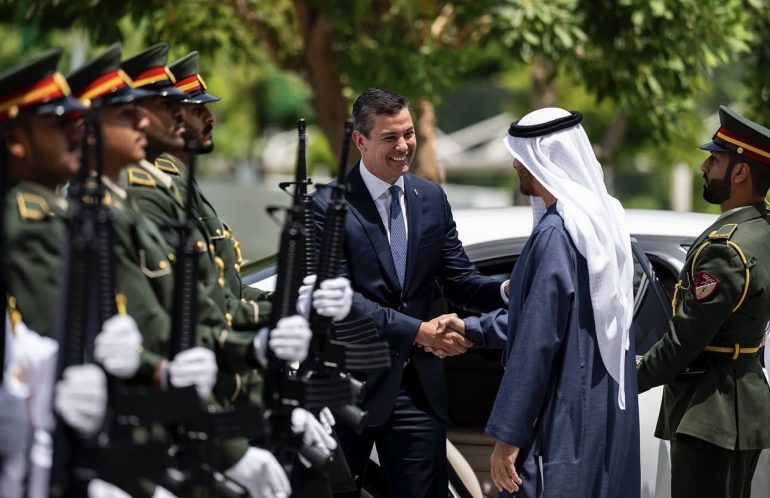Partnership between Paraguay and the United Arab Emirates (UAE) reached unprecedented levels in 2024. Paraguayan exports to the UAE totaled US$31.3 million, with frozen beef accounting for over 96% of this figure, clearly establishing it as the primary export commodity to the region. There is much to say about the Middle East partnership.
New markets for meat and more
While cultural factors preclude pork exports, there is growing interest in Paraguayan poultry, lamb, and goat meat. Initiatives are underway to expand exports to include rice, maize, wheat, and various processed foods.
Paraguay’s significant agricultural capacity, capable of feeding over 70 million people, positions it as an attractive partner for Middle Eastern nations heavily reliant on food imports.
UAE imports and opportunities for Paraguay
Conversely, Paraguay imported US$226 million in goods from the UAE in 2024. Fuels constituted the majority at 67%, with cosmetics and perfumes, products deeply rooted in Arab traditions, also being notable imports.
Paraguay already exports peppermint oil and petitgrain, and considerable opportunities exist for growth in the export of sesame, charcoal, and other essential oils. These products align with Paraguay’s strategic focus on industries that do not require heavy industrial infrastructure.
A broader Middle East partnership
The partnership between Paraguay and the Middle East extends beyond mere commerce. President Santiago Peña is actively pursuing Paraguay’s transformation into a technology and energy hub within the Southern Cone. President Peña held a bilateral meeting with His Highness Sheikh Mohamed bin Zayed Al Nahyan, President of the United Arab Emirates. During their discussion, the leaders focused on strengthening diplomatic and trade relations between the two nations, underpinned by what President Peña described as “shared principles and values.”
This meeting, part of President Peña’s official tour of Asia and the Middle East, serves to position Paraguay as a strategic bridge between Latin America and the Gulf region. Writing on X President Peña remarked, ‘We continue to work towards positioning our country as a leader in food production, sustainability, clean energy, and as a key logistics hub for global development.’
Plans include the establishment of data centers powered by Paraguay’s clean and competitively priced energy resources. Furthermore, discussions with G42, an AI company partnered with Microsoft, are exploring collaborations in digital technology, energy, and healthcare sectors.
Wider engagement across the world
Paraguay’s engagement with Asia is not limited to the UAE. Saudi Arabia imported US$8 million in Paraguayan goods, and Türkiye is exploring establishing production facilities in Paraguay to gain access to the Mercosur market. Other nations such as Iran, Iraq, Egypt, and Syria have also become purchasers of predominantly food products from Paraguay.
A notable example is Syria, which has emerged as the largest consumer of yerba mate outside South America, largely due to its significant South American diaspora.
Paraguay’s expanding global reach is further evidenced by new trade routes, such as the one opened with Singapore, now receiving Paraguayan meat exports. This illustrates how culturally significant Paraguayan products can unlock new market opportunities in unexpected regions.
The foundation of growth
Diplomatic advancements have been pivotal to this growth:
- In 2017, Paraguay and the UAE signed agreements on double taxation and investment protection.
- A visa exemption deal was subsequently implemented in 2018.
- Paraguay established an embassy in Abu Dhabi in 2022.
- Paraguay’s participation in Expo Dubai 2020 significantly enhanced its international presence.
Respect for Arab culture remains paramount to the success of these endeavors and the resulting Middle East partnership. Fostering trust, cultivating direct relationships, and honoring local traditions are fundamental to Paraguay’s commercial and diplomatic achievements in the region.
Diplomatic relations between Paraguay and the UAE officially commenced in 2007, with the partnership gaining significant momentum from 2014 onward. Both nations swiftly recognised each other as strategic partners, initially prioritizing collaboration in trade, technology, and energy, which have formed the bedrock of their current alliance.


